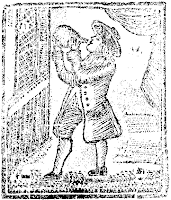New Hampshire State Liquor Stores
 During the Revolutionary War, the biggest root of domestic conflicts was probably high prices for the necessities of life. American society hadn’t embraced the market system fully, so both people and governmental authorities objected when merchants raised their prices or kept goods off the market, waiting for demand to rise further.
During the Revolutionary War, the biggest root of domestic conflicts was probably high prices for the necessities of life. American society hadn’t embraced the market system fully, so both people and governmental authorities objected when merchants raised their prices or kept goods off the market, waiting for demand to rise further.
On 27 Feb 1777, the New Hampshire Committee of Safety issued the following order to the sheriff of Rockingham County:
Whereas George Gains of Portsmouth, Esqr. (who was employed by this Committee to procure Rum for the American Army) has inform’d the Committee That Robert Parker, Thomas Martin, Neal McIntire, Mark Hunking Wentworth, Jonathan Warner, Benjamin Austin, George King, Nathaniel Folsom, George Turner, Jacob Treadwell, Ammi Ruhamah Cutter, Robert Furnass, John Hart, Tertius, Daniel & Samuel Sherburne, merchants, each of them, have West India Rum in their possession more than sufficient for their own use and consumption, which they refuse to sell him for the use of said American Army at a Reasonable rate:(I reformatted that text to make it easier to read on the internet. Here’s the original transcription.)
Therefore you are hereby required in the name of the Government & the people of the State of New Hampshire (taking with you sufficient assistance) to break open any stores, Warehouses, or other places, where such Rum may be deposited, belonging to the above named persons, or in their possession, and take from thence the following Quantities of Rum: viz. from(if the same may be found as aforesaid) and deliver the same to the said George Gains. You are also to cause all Rum taken as aforesaid to be Gaged by a sworn Gager & make return hereof (as soon as may be) with your doings herein, to the Committee of Safety.
- Robert Parker, four Hogsheads;
- Thomas Martin, Three Hogsheads;
- Neal Mclntire, one Hogshead;
- Jonathan Warner, two Hogsheads;
- Benjamin Austin, one Hogshead;
- George King, two Hogsheads;
- Nathaniel Folsom, three Hogsheads;
- George Turner, three Hogsheads,
- Jacob Treadwell, one Hogshead,
- Ammi Ruhamah Cutter, one Hogshead,
- Robert Furness, one Hogshead,
- John Hart Tertius, one Hogshead,
- Daniel and Saml. Sherburne, four Hogsheads
The sheriff carried out the order as best he could, collecting fifteen hogsheads. But he reported that eight of those men did not have “more rum than they wanted for their own use.”

4 comments:
I like the title! Coming of age in New England the liquor stores of New Hampshire were much on our young minds.
Of course they didn't have more rum than they could use for their own purposes. People can use a heck of a lot of rum!
This may be a little before your period of expertise, but is the reason we have government-run liquor stores up here (and elsewhere in New England) because of the Puritan mindset?
It seems so weird to me that we have all this freedom here (compared to where I came from, California) but we have to get our booze from the g-men.
I don’t know the 20th-century history of New Hampshire, and since I’m from Massachusetts I’d probably be dismissed even if I did. That said, I believe the state liquor stores are all about paying for government while avoiding those things called “taxes”—and if some of the money comes from people who don’t even live in the state, all the better! Of course, those things appear to be what much of life in New Hampshire is about.
Post a Comment